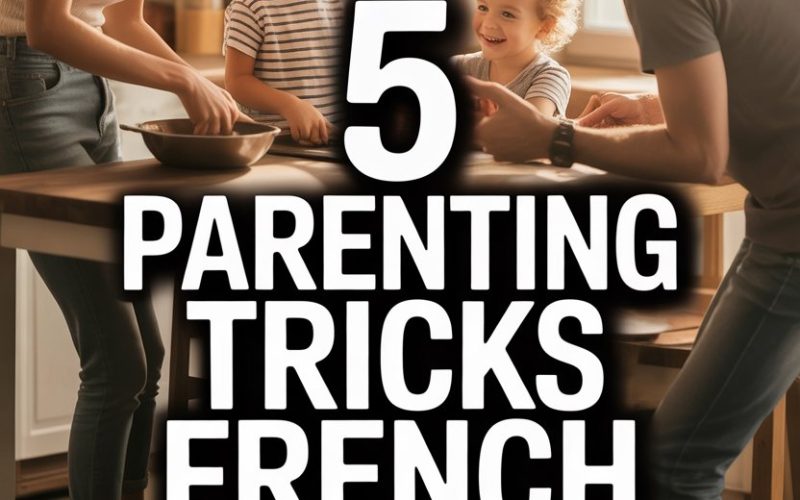French parents have a reputation, and it’s not just about chic scarves or the ability to pronounce “croissant” without spitting crumbs everywhere.
When it comes to raising kids, Gallic mums and dads seem to have a secret playbook. Their children manage to sit patiently in restaurants, eat vegetables that aren’t deep-fried, and say “bonjour” before running off to smear chocolate on the curtains.
Magic? Not quite. Let’s see which daily tricks French parents use—no beret required.
1. Le Pause: Mastering the Art of Waiting
French parents swear by “le pause,” an approach that basically means delighting in the ancient art of not immediately leaping to solve every tiny crisis.
Baby fussing in the night? They hover, they listen, and—brace yourself—they wait. Not cruelly, but with quiet confidence that their child may settle back down without an instant cuddle or bottle.
This doesn’t end with babies. Little Jacques, wanting another biscuit before dinner? French parents don’t rush to distract or bribe.
They pause. They let him ask, maybe even whine a bit, while sticking to their guns.
This pause teaches patience, frustration tolerance, and—if we’re honest—a little grit.
Paediatric sleep expert Dr. Sylvie Royant-Parola sums it up: “Babies are capable of sleeping through the night quite early, but only if parents don’t leap in at every sound.” (And if you just groaned at “sleeping through the night,” you’re in good company.)
Try it: Next time your child asks for something, don’t rush. Take a beat. Consider how you might respond—rather than react.
The world won’t stop spinning if you wait five seconds. Or even ten.
2. Bon Appétit Means Eating What’s on the Table
Meal times in France are a family affair. Children don’t get a special “kids’ menu” of chicken nuggets and pasta. They eat what everyone else eats.
If that means endives cooked with ham (which, let’s be honest, is a test of anyone’s culinary courage), they’re at least encouraged to try it.
The French believe that taste is learned, not innate. Multiple studies, including this one from the European Journal of Clinical Nutrition, have shown that repeated exposure is key: a child might need to try a new food up to 10 times before accepting it.
French parents know this, and keep offering new tastes without turning dinner into a battleground.
Of course, there are rules. Snacking is rare. Meals happen at regular times, and once everyone’s sat, it’s time to eat—politely.
Yes, even toddlers are expected to say “please” and “thank you.” Legendary French self-control? Maybe it starts at the dinner table.
Try it: Serve one meal for everyone, and gently encourage (not force) your child to try everything. No need to cajole like you’re selling time shares.
Just a simple expectation: “This is dinner.” (Or, as the French might say, “C’est la vie.”)
3. Adult Time Is Sacred, and Kids Respect It
Here’s a twist: French parents are unabashed about having adult time. Children are not expected to be the centre of every conversation, nor are they permitted to interrupt whenever the mood strikes.
You’ll find French families lingering over coffee while the children play quietly nearby. If a little one barrels in with a non-urgent request, adults calmly remind them, “Les adultes parlent.”
The message is clear: Grown-up time is important too.
This boundary isn’t just about keeping the rosé flowing and the conversation lively.
Psychologists like Pamela Druckerman, author of “Bringing Up Bébé,” point out that children learn patience, self-control, and respect for others’ needs by being gently taught when to wait their turn.
Try it: Establish a “grown-up time” at home. Tell your kids when you need a few minutes for a chat, and stick to it. If they interrupt, gently but firmly remind them it’s your time.
Expect pushback at first—especially if your home usually runs like a democracy led by a very short, shrieking president.
4. Consistency Is the Law of the Land
French parents are famously consistent. “No” means no, not “no unless you ask seventeen more times” or “no unless I need to finish this email and want you quiet.” Boundaries aren’t up for negotiation, and rules aren’t written in chalk.
Rather than endless explanations or bargaining, French parents keep things simple. “Non, c’est non.” This isn’t coldness—it’s clarity. When children know where the lines are, they relax.
The world feels safer when it’s predictable, even if that means bedtime is always at eight and pudding is only for weekends.
Research from Harvard’s Center on the Developing Child shows that clear boundaries and predictable routines help foster emotional security in children.
And if you’re exhausted by endless negotiating (and losing), that’s incentive enough.
Try it: Make one rule you stick to—without exceptions. Announce it, explain it once, and stay calm.
When the inevitable pushback comes, repeat yourself calmly. In French, if you’re feeling feisty.
5. Politesse Isn’t Optional
If you’ve ever watched a French child shake hands with an adult, you’ve seen politesse in action. Manners are non-negotiable.
From the moment they can babble, French children are prompted to say “bonjour,” “s’il vous plaît,” and “merci.” Not just to parents, but to everyone.
This isn’t a fancy add-on; it’s baked into daily life. Teachers, neighbours, the greengrocer—everyone expects, and receives, a polite greeting. These rituals do more than win points for cuteness.
Psychologists suggest that regular social routines help children feel confident and secure in the wider world. It’s a small way to tell the universe: “I see you, and you see me.”
If your attempts at enforcing “please” and “thank you” sound more like pleading than expectation, you’re not alone. But the French treat manners as part of being out in public, not as a performance for special occasions.
Try it: Before your child speaks to someone new, gently prompt them with a quiet, “What do we say?” Hold the expectation. Celebrate progress, not perfection. (Skip the guilt trip—no one’s born saying “thank you” with a Parisian flourish.)
Taking a Page from the French Playbook
French parents aren’t perfect. No one is (except possibly the grandmother who bakes perfect madeleines and never loses her temper).
Still, their daily habits offer a refreshingly practical approach—one that champions patience, consistency, healthy boundaries, and a deep belief in children’s ability to rise to the occasion.
Adopting even one of these tricks can add a little je ne sais quoi to your family life. You might not end up with a child who eats blue cheese at age three, but you will grow together.
And that’s more satisfying than a baguette fresh from the oven—well, almost.





